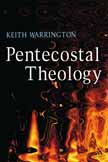The Quest for a Pentecostal Theology, by Keith Warrington
In this chapter from his book, Pentecostal Theology: A Theology of Encounter, British Pentecostal scholar Keith Warrington asks, how do you define what the core beliefs of Pentecostal theology are?
Introduction
Clark observes that Pentecostal theology ‘is researched at the researcher’s peril’1 while Ma observes that it is ‘simply impossible’ to clearly identify what is the best definition of a Pentecostal.2 Chan is concerned that Pentecostalism may be ‘in danger of death by a thousand qualifications’3 while Hollenweger writes, ‘I do not know anybody who could convincingly define what “mainstream Pentecostalism” is’, compounded by the fact that despite their differences, ‘most Pentecostal denominations believe themselves to be mainstream’.4 The comments of the latter authors indicate the challenge that many feel in attempting to identify the heartbeat of Pentecostalism.
Theology
Some have sought to identify Pentecostals on the basis of their beliefs.5 A way of identifying the core of Pentecostal theology would be to note its main theological loci. Thus, Land identifies the heart of Pentecostal theology as focused on justification, sanctification and Spirit-baptism6 though most Pentecostals view it as comprising Jesus as Saviour, healer, baptizer and coming king,7 sometimes to which is added the sanctifying role of Jesus.8 These beliefs, that are clustered around Jesus, do not encapsulate all that Pentecostalism stands for, but they do represent some of the emphases traditionally maintained by its adherents. Macchia deduces that the ‘fourfold gospel is important for understanding the origins and enduring accents of emerging Pentecostal theologies’9 though Coulter reflects that although this may have represented Pentecostals as they were, it is less valuable as a depiction of their current position which is much more diverse.10 Complicating the quest for core beliefs is that Pentecostalism is often defined differently in various cultures.11 Thus, for example, Korean Pentecostal, or Full Gospel, theology comprises salvation, healing, the second coming of Jesus, the fullness of the Spirit and blessing, the latter being a distinctive contribution of Yonggi Cho.12 In it, he argues that God desires prosperity in all aspects of the life of a believer.13
“I do not know anybody who could convincingly define what ‘mainstream Pentecostalism’ is.”
— Walter J. Hollenweger
That which most distinguishes Pentecostalism is the doctrine relating to the baptism in the Spirit. However, even the baptism in the Spirit has received varied comment by Pentecostals. For example, although many anticipate that a consequence of the baptism of the Spirit will be power, this has various nuances and expectations for different Pentecostals. Many expect to manifest this power in their lives specifically with regard to evangelism. However, the revision to the article defining the baptism in the Spirit as outlined in the AoG Statement of Fundamental Truths also identifies this power as resulting in a greater love for Jesus, while others anticipate that the baptism in the Spirit will result in a greater sense of God’s presence or a more consecrated Christian lifestyle, sometimes resulting in a crisis experience of sanctification. In practice, however, this power has been mainly associated with charismatic gifts.
But there are other divisive aspects related to this apparently central belief of Pentecostalism. The subsequent nature of the baptism in the Spirit to conversion has been a topic that has created a great deal of discussion in recent years. For example, while many assume that the baptism in the Spirit is subsequent to conversion, some disagree. Similarly, the distinctive practice of many Pentecostals has been speaking in tongues but its precise significance has been the subject of disagreement. While many Pentecostals associate the gift of speaking in tongues with the baptism in the Spirit, viewing it as the initial evidence of that experience, others do not; while some believe that when combined with the gift of interpretation they are equivalent to prophecy, others maintain that both are Godward expressions of prayer or praise; while some sanction their corporate use without interpretation, others do not.
That which most distinguishes Pentecostalism is the doctrine relating to the baptism in the Spirit.
There has also been a fluidity with regard to other doctrines during the history of Pentecostalism. Lewis identifies major changes, including the early twentieth century move away from the notion of a crisis experience associated with sanctification to a more progressive understanding of sanctification in the life of the believer, and the development of Oneness Pentecostalism. Other changes resulted from a closer relationship with evangelicals from the 1950s onwards, including less emphasis on pacifism, reduced ecumenical dialogue, restrictions on women in leadership, and a stricter understanding of the infallibility and inerrancy of the Bible.14 It is thus much more difficult to identify Pentecostals now on the basis of their doctrines because of the various nuances of beliefs, some of which are significant. However, and as importantly, this difficulty has been compounded by the fact that many aspects of theology once distinctive to Pentecostalism have now also been embraced by others; Pentecostal perspectives are not as distinct as they once were. An alternative emphasis needs to be discovered that best identifies the nucleus of Pentecostalism.
Category: In Depth, Pneuma Review, Winter 2013



